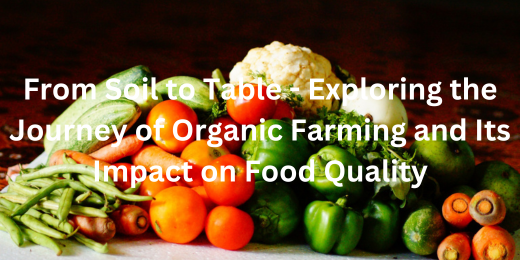
From Soil to Table – Exploring the Journey of Organic Farming and Its Impact on Food Quality
Impact of organic farming on food quality
Introduction to Organic Farming
Organic farming is a method of cultivating crops and rearing livestock without the use of synthetic chemicals like pesticides and fertilizers. It revolves around the principles of sustainability and natural processes, prioritizing the health of the soil and biodiversity conservation. This approach aims to produce food while minimizing environmental impact and preserving natural ecosystems.
Organic food journey begins with soil preparation and management, focusing on composting and crop rotation to enhance soil fertility. By avoiding synthetic inputs, organic farmers nurture healthy and nutrient-rich soils, leading to improved food quality. The emphasis on natural pest and weed management techniques further contributes to the purity and freshness of organic produce.
The impact of organic farming on food quality is significant, with studies showing higher nutrient content and lower chemical residues in organic produce. By adhering to sustainable practices, organic farming ensures that food is not only healthier but also tastes better. This journey from soil to table highlights the importance of embracing organic methods for a more sustainable and nutritious food system.
The Organic Farming Process
In the organic farming process, soil preparation and management are crucial aspects. Farmers employ techniques like composting and crop rotation to nurture healthy soils. By using natural fertilizers such as compost and manure, they enhance soil fertility and structure, ensuring optimal conditions for plant growth.
Effective pest and weed management in organic farming involves implementing biological control methods and utilising companion planting and physical barriers. These practices help maintain an ecological balance in the agricultural ecosystem, reducing reliance on synthetic pesticides. By prioritising natural solutions, organic farmers safeguard both the environment and food quality.
The impact of organic farming on food quality is evident in the healthier, more nutrient-rich produce it yields. Through sustainable soil and pest management practices, organic farming ensures that food is free from harmful chemical residues. This emphasis on natural processes throughout the organic food journey contributes to a safer, tastier, and more nutritious food supply.
Benefits of Organic Farming
Improved Food Quality:
- Organically grown produce has higher nutrient content compared to conventionally grown counterparts.
- Organic farming methods result in a reduction in harmful chemical residues on food, promoting healthier consumption.
- The emphasis on natural processes in organic farming enhances the taste and freshness of food, providing a more enjoyable eating experience.
Environmental Conservation:
- Organic farming practices contribute to the preservation of soil health and fertility, vital for sustainable agriculture.
- By eschewing synthetic inputs, organic farming helps in the reduction of pollution and greenhouse gas emissions, mitigating environmental damage.
- The adoption of organic methods also plays a role in the protection of biodiversity and ecosystems, safeguarding natural habitats.
The impact of organic farming on food quality and the environment underscores its importance in fostering a healthier and more sustainable food system. Through the production of nutrient-rich, chemical-free food, organic farming not only benefits consumers but also contributes to environmental conservation. Embracing the organic food journey is not just a choice for individuals; it’s a step towards a better future for all.
Challenges Faced by Organic Farmers
Organic farming presents numerous challenges for farmers, affecting food quality and the organic food journey. The initial transition period demands significant time and resources, with farmers needing to adopt new practices and methodologies. Financial constraints often arise during this phase, as investments are required without immediate returns.
Market access and certification pose additional hurdles. The costs and complexities associated with obtaining organic certification can be prohibitive for many farmers. Furthermore, limited access to organic markets and distribution channels can impede the ability to sell produce at premium prices.
Despite these challenges, the impact of organic farming on food quality is undeniable. Through perseverance and dedication, farmers can overcome obstacles and reap the rewards of producing high-quality organic food. By prioritizing sustainable practices, they contribute to a healthier food system for consumers and the environment alike.
Impact of Organic Farming on South Indian Agriculture
Impact of organic farming extends to South Indian agriculture, influencing food quality and the organic food journey. By promoting sustainable practices, farmers adopt traditional methods aligned with local ecosystems, reviving indigenous crops and knowledge.
Contribution to rural livelihoods is significant. Small-scale farmers and rural communities are empowered through organic farming, generating employment and enhancing food security. Integration of organic practices with traditional methods like agroforestry strengthens resilience against environmental challenges.
In South India, the impact of organic farming on food quality is profound. Through sustainable practices and community involvement, organic agriculture not only ensures better-quality produce but also fosters socio-economic development in rural areas.
Conclusion: Embracing the Organic Journey
In conclusion, embracing the organic food journey is essential for consumers and policymakers alike. Consumers can support local organic producers and markets, promoting awareness of the health and environmental benefits of organic food.
Policymakers play a crucial role in driving change. Implementing supportive policies and incentives for organic farming is necessary. Investment in research and extension services, along with integrating organic principles into national agricultural strategies, can foster a sustainable future.
By working together, consumers and policymakers can advance the impact of organic farming on food quality. Through advocacy, support, and action, we can build a healthier, more resilient food system for generations to come.
Shop at the Uyir Organic Farmers Market in your community to acquire premium organic products. Additionally, you can purchase them online at www.uyirorganic.farm or www.uyironline.in.